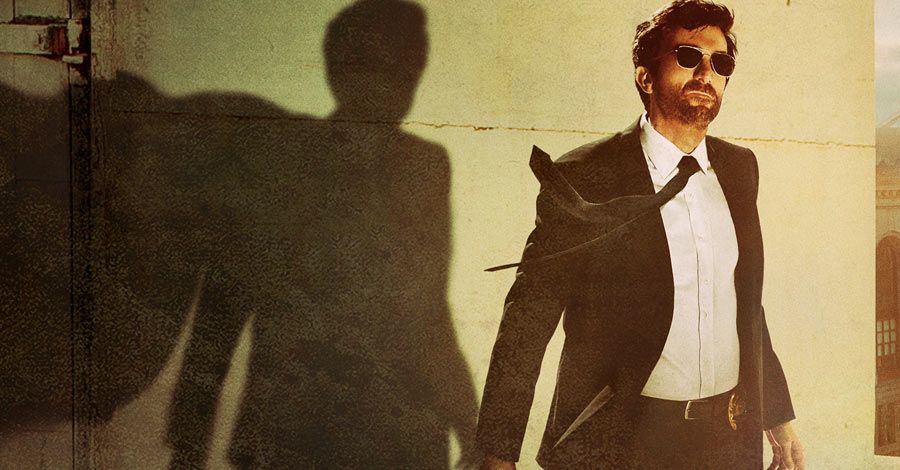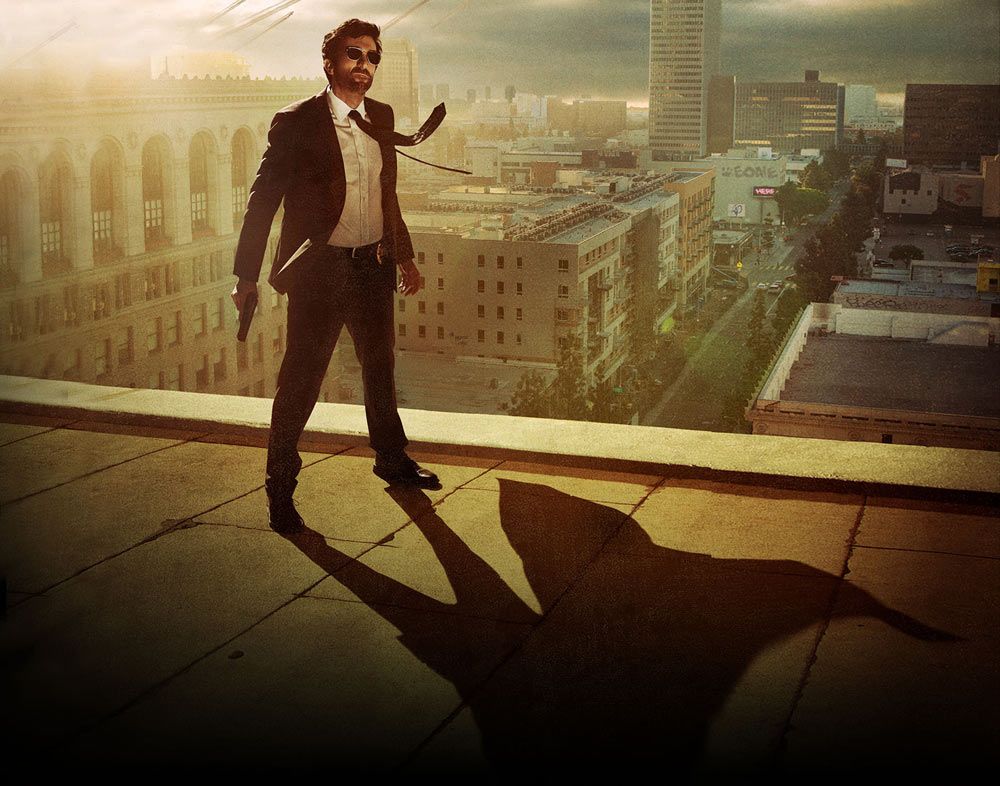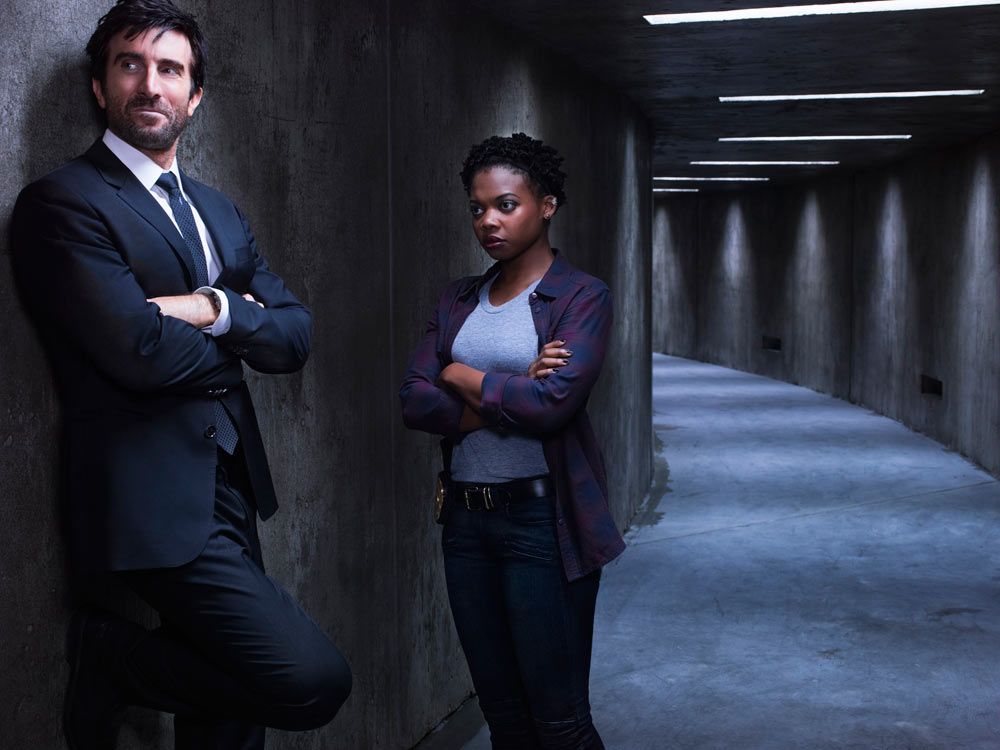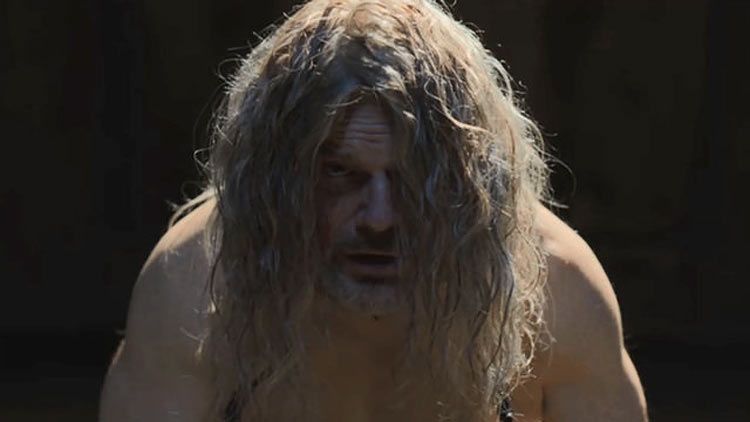From "District 9" to "Chappie," Sharlto Copley has played his share of characters in the midst of becoming something a little left of center of human. Now, with the PlayStation Network's "Powers," a crime procedural based on the Brian Michael Bendis and Michael Avon Oeming series of the same name, he's playing someone who's a little left of center of superhuman.
RELATED: Eddie Izzard Devours the "Poetic Darkness" of His "Powers" Role
Copley plays the lead role of former powered-up superhero-turned-Powers Division police detective Christian Walker in the TV adaptation of the long-running comic book series. "Powers" launches on the gaming platform with three episodes available March 10, followed by a new episode from the 10-part season subsequently appearing each week. As Copley revealed in a recent conference call with the media, don't expect the live-action Christian Walker to line up exactly with the one you've been reading about all these years.
On the tweak to Christian Walker's character that makes him a Power who remains well-known to the public:
Sharlto Copley: Coming into this, Charlie [Huston], the showrunner, had said to me -- I was not familiar with the "Powers" comics, and he specifically said to me, "Look, I really don't want you to go too much into the comic books." Charlie and I have a version of this world that we would like to create for television that is a bit different to the comics, and so I didn't do that. I never got into what the major differences were. Certainly I'm aware now, subsequently, of the difference, and that was . I like that in a lot of the performances that I've done.
For example, this kind of thematic idea of people's obsession with fame, an obsession with power that we have in the world, and so in this "Powers" world that you have in the show, the people with powers -- and there are many of them, with different levels of powers: one guy might be able to levitate three feet off the ground, and that's all what he can do, and then you have the Retro Girl, who's more like a super woman with a wide range of powers -- these are the people that young teenagers aspire to be like. Instead of Brittany Spears on an endorsement for a soft drink, you've got Retro Girl. So you have Christian Walker, back in the day, was one of the very famous Powers. He had almost Superman-like powers. He could fly. He had invulnerability. He had a couple of powers like that.
And what is even important in that world is one of the things that grounds the series in reality is, just because you can fly doesn't mean you're going to go and help people, and how are you going to make money doing that? And if there's other guys that can fly, how [can] you get noticed? And you could draw an analogy with music performers, with rock stars or with actors -- there are lots of people doing it. Who are the ones getting known and why did they get known?
Christian was, for example, very good at getting attention. He was very charming, he was good at playing the media, in addition to being somebody who was a hero and helped people, and he was very floored in the sense that he was a rock star. He had his groupies. He did drugs. He drank. He sort of would go off the rails at times -- but still be a superhero. So you have a man as you come into the show who's really haunted by the fact that once he was this very famous, powerful guy. A person who could kind of do whatever kind of wanted. He was also loved by many people in the public.
How did that backstory help? Amongst many other things, ultimately I think it hopefully leads to a more entertaining character that can go in a lot of different directions. He desperately wants to fly again, like he could back in the day. He's haunted by memories of his past, mistakes he made. And just as a character, looking at him when you start watching the show, it might be difficult to believe why this guy at a certain point was very charismatic. So that's really fun, playing a character that is so multi-faceted. There's a part of him, because he became famous and powerful at a young age, that's almost back as a kid. Again, you don't see too much of that in the early episodes, but it's there in certain environments, the kind of spoiled kid that doesn't get his way. It's kind of at a certain level of emotional immaturity in relationships starts to come out.
On the advantages and conflicts that may arise from Walker and Pligrim's very disparate backgrounds:
The relationship between Christian and Deena is very, very critical to I think what makes the show interesting to watch. That was one of the things I was very relieved about watching the first table read that I had with Susan Heyward who plays Deena. We just kind of had a connection straightaway. We had kind of personally, like a real kind of heart connection and got on really well. As actors we just had a lot of fun, you know kind of antagonizing each other from time to time, but Christian knows about Powers. He was in that world for a long time. He knows about superheroes. He has a lot of experience, practically, in fighting them and dealing with them, in reading situations involving them and understanding how they think, and understanding the limitations of certain people's powers. He's one of the best people at having that information.
He's also used to doing whatever the fuck he likes, frankly, and being sort of alone, by himself, and not really having to listen to people -- certainly not fill-out-paperwork and that sort of thing. Now you have Deena, who's tried to be this sort of by-the-book cop and very focused on detail, and very focused on following the rules, who doesn't have the same level of ego that Christian, being a former rock star, has, and so that creates a very interesting situation where they both have skills that are practically useful in solving crimes. She's looking at details, making calculations about what might have happened. As a detective, he's looking at how Powers behave and what the limitations are here or what the likelihood of this power behaving in this way. That's all very useful to police work.
But then, the two personalities clash quite considerably, in the sense that Christian is way more kind of self-centered and pretty much wants to do what he wants to do, and Deena's more out for trying to be like, "We should be working as a team here." And Christian is not so much of a team player.
On building on his chemistry with Susan Heyward:
We both wanted to apply ourselves as best as we could to this, and so we spent quite a bit of time outside of the regular shooting hours, or just in down time when they were shooting with someone else, or we had time between set-ups just constantly talking about the characters... She and I took it very, very seriously. I've probably got the most mated I've ever got with the character on anything I've ever done, with this Christian character over those four months. I would stay in character pretty much the whole day for the first two months that I was on the set, but I would sit and spend time with Susan and we would play around, and I think we were constantly communicating.
I'd never worked on TV before. You're changing directors, constantly. Sometimes the showrunner's there, sometimes he's not. Eventually it gets left sort of between you to make sure you're doing the best you can with the material and the scripts you've been given, and so we would constantly talk to each other in scenes, explore ways into a scene, try different tones within a scene. "Hey, what if we pushed it this way? What if we pushed it that way?" And, very fortunately, we had, in the case of Charlie, a showrunner who was prepared to let us go with the script a little bit from time to time, throw in our little ideas from time to time.
And once we set up, we then had a real understanding, quite quickly, of major things between our two characters that would create sources of tension, but also then underlying that. Why the two characters would need each other? Why would they be helpful to each other as the season progressed or even went into other seasons? And why they would get close or kind of bond. Why they would need each other, if you will.
On Walker's relationship with "Big Bad" Wolfe, played by Eddie Izzard:
As is the case with so many of the characters in the way that Charlie writes, there's so many nuanced and layered elements to the characters and their relationships with the other characters in the series. With Christian and Wolfe, probably one of the more useful analogies might be sort of a father-and-son relationship that's kind of gone horribly wrong. [There are] incredibly mixed emotions with Christian whenever he's dealing with Wolfe, and I think the two of us had an enormous kind of intensity and kind of chemistry on screen that I really enjoyed, playing the scenes with him and then watching stuff back afterwards. But Wolfe is in Christian's life as Christian discovers that he has these powers and is kind of an inspirational role model figure in the early days -- until things start to go a little wrong.
On how Walker's longing for his Powers past affects his present life:
He's definitely a little bit of kind of resentful and going through a whole bunch of different emotions. I think one of the factors was kind of [the] idea of kind of sour grapes, in the sense that now that he no longer has the power anymore, he can kind of be more judgmental of the behavior of some of those powers, while forgetting that he himself wasn't exactly the most exemplary role model back in the day when he was super-powerful and he was Diamond and everyone was looking up to him. So there is this kind of a little bit of hypocrisy that kind of comes in there as well.
Like, "Who do these people think they are? Just because they have powers, they think they can do anything they like!" But he, himself, wants to be in that position. [It's] just one of the many things that makes the man incredibly conflicted, and there's a lot of internal stuff going on that is you know is constantly getting manifested externally in some other way in terms of his behavior.
On the people of the world of "Powers" and their obsession with superhumanity:
The idea that some form of superpower is as prevalent as it is in this world, that there's a lot of people that have marginal powers -- you've got a guy who levitates a little bit off the ground, or you might have someone who can breathe a little bit of fire, or somebody that can freeze a little bit of something if it's really close to him -- these are things that, on the one hand ,you sort of say, well, "What do you do with that? How is that useful to you?" But because there is so much of it around you, seeing it and then you seeing it, it becomes the important thing in society. It's like rock stars: there are musicians all over the place, there's millions and millions and millions of bands everywhere, but that doesn't mean that people aren't obsessed with their favorite rock star or their favorite rapper.
Going deeper than that in the series and speaking to the kind of social commentary aspect, the metaphors and the form, the obsession with Powers to a certain degree is the obsession with power -- with actual power in one's own life. Metaphorically, that was very much how I saw it, and I think what the series has something to say about. So, yes, people are obsessed with powers. On the surface, that's all, "Yeah, I wish I could levitate or wish I could freeze things or wish whatever." But it's really just, "You're special. You have some power in the world. Look, people are looking at you and they think you're special." You just have to look at Facebook or Twitter whatever to see that our society, more than it's ever been probably in its history, is reaching that point of people's desperation of "Please notice me, notice me! I'm special! On Facebook, I'm my own magazine. Here I am. I'm important. I'm something. Look at me. I'm funny. I'm interesting." And this show for me is very much a metaphor of that. It's very much going "Look how obsessed people are with power, with being noticed, with being special."
The first three episodes of "Powers" debut on the PlayStation Network on March 10.




